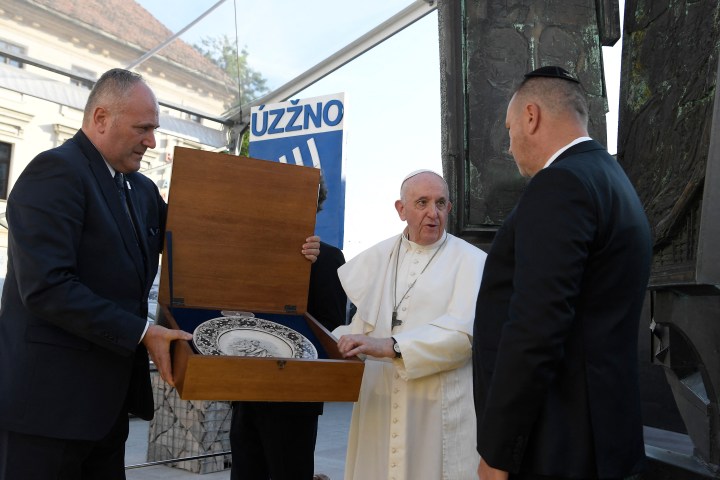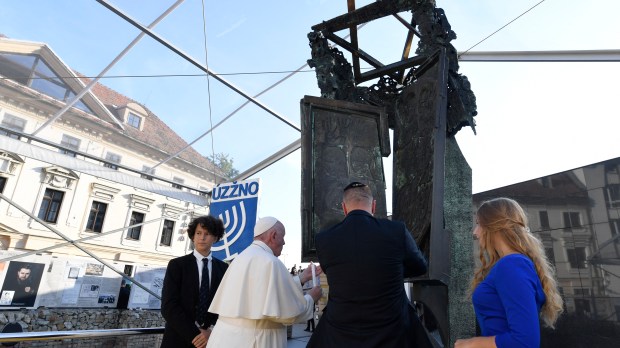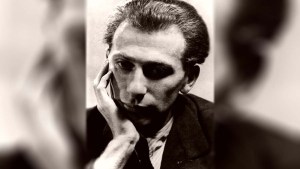The Jewish Communities of Slovakia suffered one of the most ruthless persecutions of Europe. In addition to the German-Nazi oppression, the Slovak government of the times participated in decimating them, deporting thousands of Slovak Jews to the concentration camps. An errant priest was president of the Slovak republic that was a puppet state of Germany.
Only a small remnant of Slovakia’s Jews were left after the Holocaust. The atrocities continued after the War. In 1969, the city’s Neolog Synagogue was demolished by the government, in an attempt to wipe out all traces of the Jewish community of the country.
The synagogue had stood beside the cathedral, a striking testament to coexistence.
Pope Francis was in the Square where the synagogue stood to address the Slovakian Jewish community.
“The divine Name, the Lord himself, is blasphemed whenever the unique and distinctive dignity of the human person, created in his image, is violated,” the Pope said.
Here, in this place, the Name of God was dishonoured, for the worst form of blasphemy is to exploit it for our own purposes, refusing to respect and love others. Here, reflecting on the history of the Jewish people marked by this tragic affront to the Most High, we admit with shame how often his ineffable Name has been used for unspeakable acts of inhumanity! How many oppressors have said: “God is with us”; yet it was they, who were not with God!
Our history
The Pope urged remembrance.
Dear brothers and sisters, your history is our history, your sufferings are our sufferings. For some of you, this Memorial of the Shoah is the only place where you can honour the memory of your loved ones. I join with you in this. The word “zechor” – “Remember!” – is inscribed in Hebrew on this Memorial. Memory cannot and must not give way to forgetfulness, for there will be no lasting dawn of fraternity unless we have first shared and dispelled the darkness of the night. For us too, the prophet’s question echoes: “Watchman, what of the night?” (Is 21:11).
He called for collaboration in protecting human dignity, the image of God. “For in our day too, so many empty and false idols dishonour the Name of the Most High: the idols of power and money that prevail over human dignity; a spirit of indifference that looks the other way; and forms of manipulation that would exploit religion in the service of power or else reduce it to irrelevance.”
But also forgetfulness of the past, ignorance prepared to justify anything, anger and hatred. I repeat: let us unite in condemning all violence and every form of anti-Semitism, and in working to ensure that God’s image, present in the humanity he created, will never be profaned.
Jewish-Catholic relations in Slovakia took a big step forward in 2017 when representatives of both groups met at the Vatican, a meeting of which the Pope said he had “vivid memories.”
“It is good,” he said, “to share and make known the things that unite us. And it is good to advance, in truth and honesty, along the fraternal path of a purification of memory, to heal past wounds and to remember the good received and offered.”

A survivor and historian
Before his speech, Pope Francis heard the testimony of Tomas Lang, a Holocaust survivor. Born in 1942, he lost his father and then his mother, before being hidden by a nurse in a hospital room that was marked as for infectious diseases, “to keep armed men away.”
“I regret in perpetuity that I was not able to find her later to say a human thank you,” he said.
For 20 years, Tomas Lang has devoted himself to the history of the Shoah.
“I am writing a memory for the future, so the past will never happen again.” In the sad history of the Holocaust in Slovakia, he recalled, the name of the charge d’affaires of the nunciature in Slovakia at the time, Bishop Giuseppe Burzio, who tirelessly tried to put an end to anti-Semitism of the murderous regime of the time, is written in big letters.”
This meeting took place on the small Rybne Namestie square near the Saint Martin cathedral. It was here that the Jewish community was founded in 1871 and a synagogue was built in 1893, before being demolished by the Communist government in 1969, along with the whole ghetto.
Today the square houses the Holocaust Memorial in honor of the 105,000 Jews of Slovakia who lost their lives during World War II. The memorial includes a black wall, created by architect Peter Zalman in 1995, on which is reproduced the silhouette of the synagogue, and an abstract bronze sculpture surmounted by a Star of David.
Also hope
Pope Francis recognized that the Square “is also a place where the light of hope shines forth.”
Each year you come here during Hanukkah to light the first lamp on the menorah. Darkness is dispelled by the message that destruction and death do not have the last word, but rather renewal and life. Though the synagogue on this site was torn down, the community remains present. A community alive and open to dialogue.
In this place, our histories meet once more. Here let us affirm together before God our willingness to persevere on the path of rapprochement and friendship.
Article updated after initial publication


